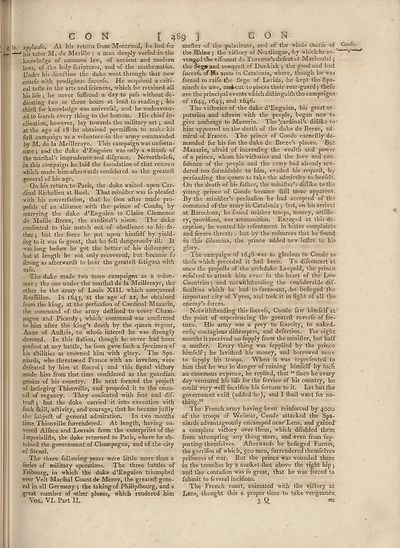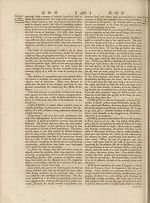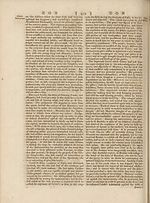Encyclopaedia Britannica, or, a Dictionary of arts, sciences, and miscellaneous literature : enlarged and improved. Illustrated with nearly six hundred engravings > Volume 6, CHI-Crystallization
(519) Page 489
Download files
Complete book:
Individual page:
Thumbnail gallery: Grid view | List view

le.
CON 1' 489 ] CON
apylaufe. At his return from Mon trend, he had-fur
'his tutor M. de Merille ; a man deeply verfed in the
knowledge of common law, of ancient and modem
laws, of the holy feriptures, and of the mathematics.
Under his diredlion the duke went through that new
courfe with prodigious fuccefs. He acquired a criti¬
cal tafte in the arts and fciences, which he retained all
his life ; he never fuffered a day to pafs without de¬
dicating two or three hours at lead; to reading j his
third for knowledge was univerfal, and he endeavour¬
ed to fearch every thing to the bottom. His chief in¬
clination, however, lay towards the military art *, and
at the age of 18 he obtained permidion to make his
fird campaign as a volunteer in the army commanded
by M. de la Meilleraye. This campaign was unfortu¬
nate ; and the duke d’Enguien was only a witnefs of
the mardial’s imprudence and difgrace. Neverthelefs,
in this campaign he laid the foundation of that renown
which made him afterwards confidered as the greated
general of his age.
On his return to Paris, the duke waited upon Car¬
dinal Richelieu at Ruel. That minider was fo pleafed
with his converfation, that he foon after made pro-
pofals of an alliance with the prince of Condej by
marrying the duke d’Enguien to Claire Clemence
de Maille Breza, the cardinal’s niece. The duke
confented to this match out of obedience to his fa¬
ther ; but the force he put upon himfelf by yield¬
ing to it was fo great, that he fell dangeroudy ill. It
was long before he got the better of his didemper ‘
but at length he not only recovered, but became fo
drong as afterwards to bear the greated fatigues with
eafe.
The duke made two more campaigns as a volun¬
teer the one under the marfhal de la Meilleraye, the
other in the army of Louis XIII. which conquered
Rouflillon. In 1643, at t^le age 2-2> obtained
from tire king, at the perfuafion of Cardinal Mazarin,
the command of the army dedined to cover Cham¬
pagne and Picardy; which command was confirmed
to him after the king’s death by the queen regent,
Anne of Audria, to whofe intered he was drongly
devoted. In this dation, though he never had been
prefent at any battle, he foon gave fuch a fpecimen of
his abilities as crowned him with glory. The Spa¬
niards, who threatened France with an invafion, were
defeated by him at Rocroi *, and this fignal viffory
made him from that time confidered as the guardian
genius of his country. He next formed the projefl
of befieging Thionville, and propofed it to the coun¬
cil of regency. They confented with fear and dif-
trud -y but the duke carried it into execution with
fuch Ikill, aftivity, and'courage, that he became judly
the fubjeft of general admiration. In two months
time Thionville furrendered. At length, having co¬
vered Alface and Lorrain from the enterprifes of the
Imperialids, the duke returned to Paris, where he ob¬
tained the government of Champagne, and of the city
of Stenai.
The three following-years were little more than a
feries of military operations. The three battles of
Fribourg, in which the duke d’Enguien triumphed
over Veit Marlhal Count de Mercy, the greated gene¬
ral in all Germany *, the taking of Philipfbourg, and a
great number of other plaees, which rendered him
Vol, VI. Part IL
mader of the palatinate, and of the whole courie of
the Rhine j the viftory of Nortlingue, by which he re- '
venged the vifeount du Turenne’s defeat at Mariendal j
the fiegjrand conqued of Dunkirk j the good and bad
fuccefs of Ms arms in Catalonia, where, though he was
forced to raife the fiege of Lerida, he kept the Spa¬
niards in awe, anckcut to pieces their rear-guard; thefe
are the principal events which didinguidi the campaigns
of 1644, 1^45> and 1646.
The viftories of the duke d’Enguien, his great re ¬
putation and edeem with the people, began now to
give umbrage to Mazarin. The ’cardinal’s dillike to'
him appeared on the death of the duke de Breze, ad¬
miral of France. The prince of Conde earnedly de¬
manded for his fon the duke de Breze’s places. But
Mazarin, afraid of increafing the wealth and power
of a prince, whom his viftories and the love and con¬
fidence of the people and the army had already ren¬
dered too formidable to him, evaded his requeit, by
perfuading the queen to take the admiralty to herfelf.
On the death of his father, the minifter’s difiike to the
young prince of Conde became ftill more apparent.
By the minifter’s perfuafion he had accepted of the
command of the army in Catalonia ) but, on his arrival
at Barcelona, he found neither troops, money, artille-
ry, provifions, nor ammunition. Enraged at this de¬
ception, he vented his refentment in bitter complaints
and fevere threats: but by the refources that he found
in this dilemma, the prince added new luftre to his
glory.
The campaign of 1648 was as glorious to Conde as
thofe which preceded it had been. To difconcert at
once the projefts of the archduke Leopold, the prince
refolved to attack him even' in the heart of the Low
Countries; and notwithftanding the confiderable dif¬
ficulties which he had to furmount, .he befieged the
important city of Ypres, and took it in fight of all the
enemy’s forces.
Notwithftanding this fuccefs, Conde faw himfelf at
the point of experiencing the greateft reverfe of for¬
tune. His army was a prey to fcarcity, to naked-
nefs, contagious diftempers, and defertion. For eight
months it received no fupply from the minifter, but half
a mufter. Every thing was fupplied by the prince
himfelf *, he laviihed his money, and borrowed more
to fupply his troops. When it was reprefented to
him that he was in danger of ruining himfelf by fuefi
an enormous expence, he replied, that “ fince he every
day ventured his life for the fervice of his country, he
could very well facrifice his fortune to it. Let but the
government exift (added he), and I (hall want for no¬
thing.”
The French army having been reinforced by 4000
of the troops of Weimar, Conde attacked the Spa¬
niards advantageoufly encamped near Lens, and gained'
a complete viftory over them, which difabled them
from attempting any thing more, and even from fup-
porting themfelves. Afterwards he befieged Furnes,
the garrifon of which,.500 men, furrendered themfelves
prifoners of war. But the prince was wounded there
in the trenches by a mulket-ftiot above the right hip j
and the contufion was fo great, that he was forced to
fubmit to feveral incifions.
The French court, animated with the viftory at
Lens, thought this a proper time to take vengeance
a Q.
Conde.
CON 1' 489 ] CON
apylaufe. At his return from Mon trend, he had-fur
'his tutor M. de Merille ; a man deeply verfed in the
knowledge of common law, of ancient and modem
laws, of the holy feriptures, and of the mathematics.
Under his diredlion the duke went through that new
courfe with prodigious fuccefs. He acquired a criti¬
cal tafte in the arts and fciences, which he retained all
his life ; he never fuffered a day to pafs without de¬
dicating two or three hours at lead; to reading j his
third for knowledge was univerfal, and he endeavour¬
ed to fearch every thing to the bottom. His chief in¬
clination, however, lay towards the military art *, and
at the age of 18 he obtained permidion to make his
fird campaign as a volunteer in the army commanded
by M. de la Meilleraye. This campaign was unfortu¬
nate ; and the duke d’Enguien was only a witnefs of
the mardial’s imprudence and difgrace. Neverthelefs,
in this campaign he laid the foundation of that renown
which made him afterwards confidered as the greated
general of his age.
On his return to Paris, the duke waited upon Car¬
dinal Richelieu at Ruel. That minider was fo pleafed
with his converfation, that he foon after made pro-
pofals of an alliance with the prince of Condej by
marrying the duke d’Enguien to Claire Clemence
de Maille Breza, the cardinal’s niece. The duke
confented to this match out of obedience to his fa¬
ther ; but the force he put upon himfelf by yield¬
ing to it was fo great, that he fell dangeroudy ill. It
was long before he got the better of his didemper ‘
but at length he not only recovered, but became fo
drong as afterwards to bear the greated fatigues with
eafe.
The duke made two more campaigns as a volun¬
teer the one under the marfhal de la Meilleraye, the
other in the army of Louis XIII. which conquered
Rouflillon. In 1643, at t^le age 2-2> obtained
from tire king, at the perfuafion of Cardinal Mazarin,
the command of the army dedined to cover Cham¬
pagne and Picardy; which command was confirmed
to him after the king’s death by the queen regent,
Anne of Audria, to whofe intered he was drongly
devoted. In this dation, though he never had been
prefent at any battle, he foon gave fuch a fpecimen of
his abilities as crowned him with glory. The Spa¬
niards, who threatened France with an invafion, were
defeated by him at Rocroi *, and this fignal viffory
made him from that time confidered as the guardian
genius of his country. He next formed the projefl
of befieging Thionville, and propofed it to the coun¬
cil of regency. They confented with fear and dif-
trud -y but the duke carried it into execution with
fuch Ikill, aftivity, and'courage, that he became judly
the fubjeft of general admiration. In two months
time Thionville furrendered. At length, having co¬
vered Alface and Lorrain from the enterprifes of the
Imperialids, the duke returned to Paris, where he ob¬
tained the government of Champagne, and of the city
of Stenai.
The three following-years were little more than a
feries of military operations. The three battles of
Fribourg, in which the duke d’Enguien triumphed
over Veit Marlhal Count de Mercy, the greated gene¬
ral in all Germany *, the taking of Philipfbourg, and a
great number of other plaees, which rendered him
Vol, VI. Part IL
mader of the palatinate, and of the whole courie of
the Rhine j the viftory of Nortlingue, by which he re- '
venged the vifeount du Turenne’s defeat at Mariendal j
the fiegjrand conqued of Dunkirk j the good and bad
fuccefs of Ms arms in Catalonia, where, though he was
forced to raife the fiege of Lerida, he kept the Spa¬
niards in awe, anckcut to pieces their rear-guard; thefe
are the principal events which didinguidi the campaigns
of 1644, 1^45> and 1646.
The viftories of the duke d’Enguien, his great re ¬
putation and edeem with the people, began now to
give umbrage to Mazarin. The ’cardinal’s dillike to'
him appeared on the death of the duke de Breze, ad¬
miral of France. The prince of Conde earnedly de¬
manded for his fon the duke de Breze’s places. But
Mazarin, afraid of increafing the wealth and power
of a prince, whom his viftories and the love and con¬
fidence of the people and the army had already ren¬
dered too formidable to him, evaded his requeit, by
perfuading the queen to take the admiralty to herfelf.
On the death of his father, the minifter’s difiike to the
young prince of Conde became ftill more apparent.
By the minifter’s perfuafion he had accepted of the
command of the army in Catalonia ) but, on his arrival
at Barcelona, he found neither troops, money, artille-
ry, provifions, nor ammunition. Enraged at this de¬
ception, he vented his refentment in bitter complaints
and fevere threats: but by the refources that he found
in this dilemma, the prince added new luftre to his
glory.
The campaign of 1648 was as glorious to Conde as
thofe which preceded it had been. To difconcert at
once the projefts of the archduke Leopold, the prince
refolved to attack him even' in the heart of the Low
Countries; and notwithftanding the confiderable dif¬
ficulties which he had to furmount, .he befieged the
important city of Ypres, and took it in fight of all the
enemy’s forces.
Notwithftanding this fuccefs, Conde faw himfelf at
the point of experiencing the greateft reverfe of for¬
tune. His army was a prey to fcarcity, to naked-
nefs, contagious diftempers, and defertion. For eight
months it received no fupply from the minifter, but half
a mufter. Every thing was fupplied by the prince
himfelf *, he laviihed his money, and borrowed more
to fupply his troops. When it was reprefented to
him that he was in danger of ruining himfelf by fuefi
an enormous expence, he replied, that “ fince he every
day ventured his life for the fervice of his country, he
could very well facrifice his fortune to it. Let but the
government exift (added he), and I (hall want for no¬
thing.”
The French army having been reinforced by 4000
of the troops of Weimar, Conde attacked the Spa¬
niards advantageoufly encamped near Lens, and gained'
a complete viftory over them, which difabled them
from attempting any thing more, and even from fup-
porting themfelves. Afterwards he befieged Furnes,
the garrifon of which,.500 men, furrendered themfelves
prifoners of war. But the prince was wounded there
in the trenches by a mulket-ftiot above the right hip j
and the contufion was fo great, that he was forced to
fubmit to feveral incifions.
The French court, animated with the viftory at
Lens, thought this a proper time to take vengeance
a Q.
Conde.
Set display mode to:
![]() Universal Viewer |
Universal Viewer | ![]() Mirador |
Large image | Transcription
Mirador |
Large image | Transcription
Images and transcriptions on this page, including medium image downloads, may be used under the Creative Commons Attribution 4.0 International Licence unless otherwise stated. ![]()
| Permanent URL | https://digital.nls.uk/193014170 |
|---|
| Attribution and copyright: |
|
|---|
| Description | Ten editions of 'Encyclopaedia Britannica', issued from 1768-1903, in 231 volumes. Originally issued in 100 weekly parts (3 volumes) between 1768 and 1771 by publishers: Colin Macfarquhar and Andrew Bell (Edinburgh); editor: William Smellie: engraver: Andrew Bell. Expanded editions in the 19th century featured more volumes and contributions from leading experts in their fields. Managed and published in Edinburgh up to the 9th edition (25 volumes, from 1875-1889); the 10th edition (1902-1903) re-issued the 9th edition, with 11 supplementary volumes. |
|---|---|
| Additional NLS resources: |
|

